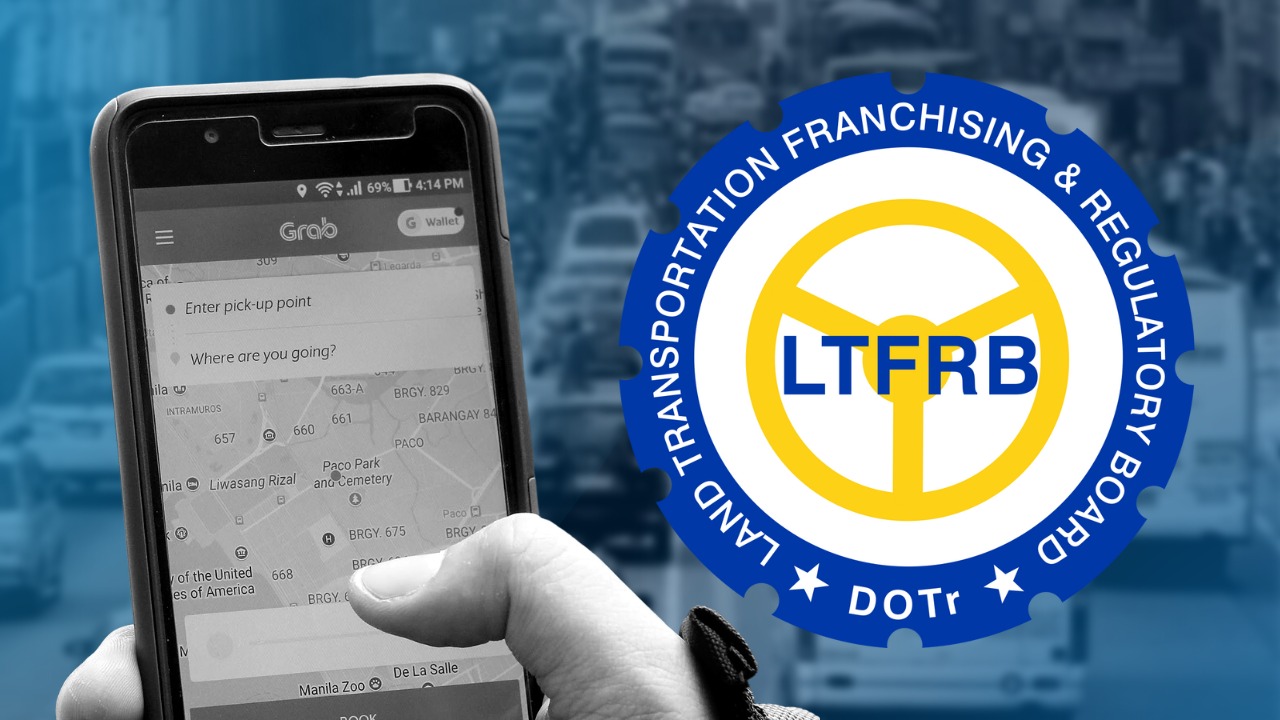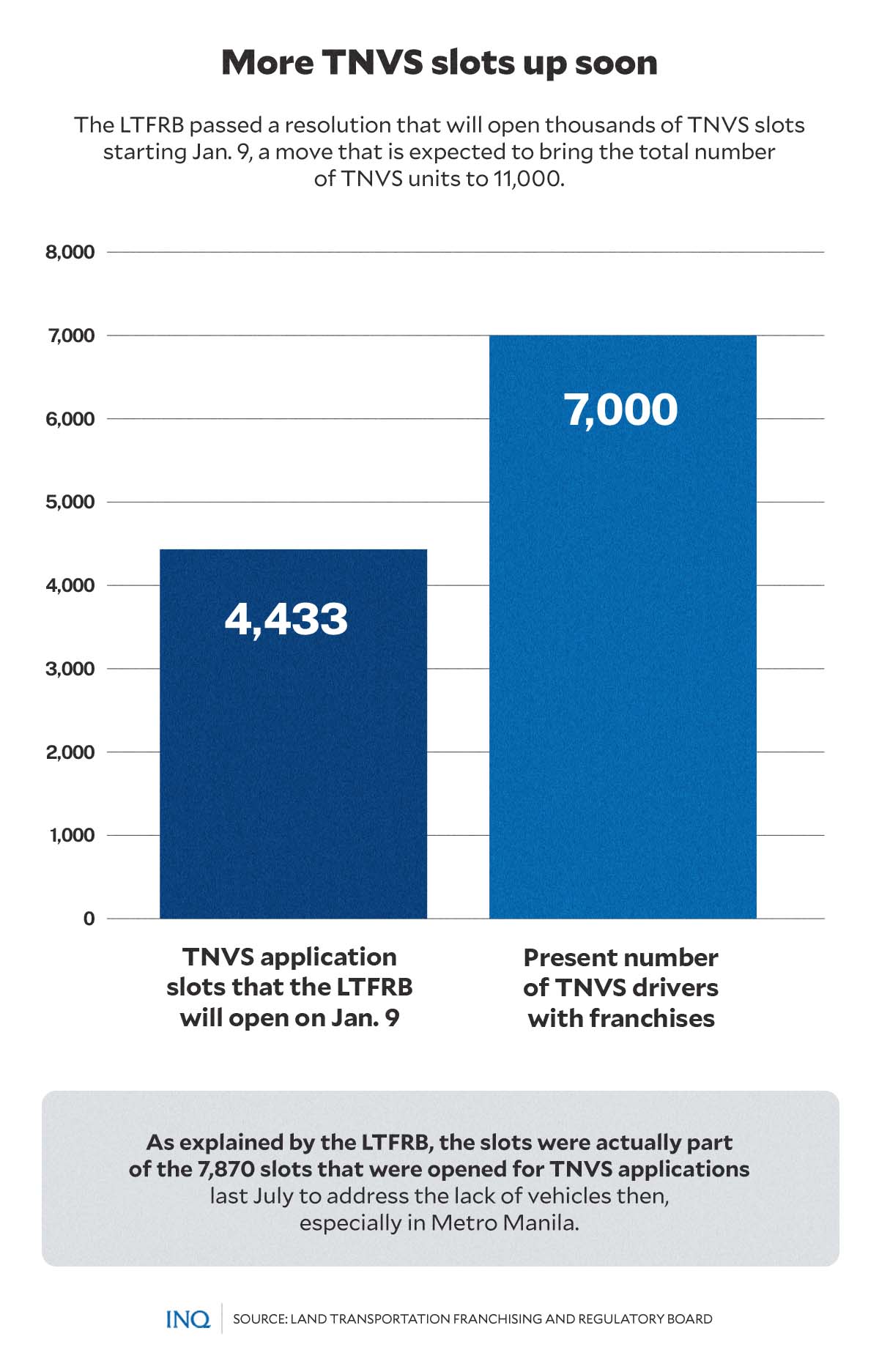Can’t book rides? Relief in sight as LTFRB opens 4,433 TVNS slots
MANILA, Philippines—The Land Transportation Franchising and Regulatory Board (LTFRB) passed a resolution that will open over 4,000 transport network vehicle service (TNVS) slots, a move that is seen to “improve” the ride-hailing experience of Filipinos just as the difficulty of getting rides became more prominent during this holiday season.
The LTFRB, amid reports of difficulty in booking rides, especially last December, passed the resolution dated Dec. 14, 2022, stating that it will open 4,433 TNVS slots starting this year.
Based on data from the LTFRB, there are currently 7,000 drivers who have franchises, while there are a few that are operating with provisional licenses to serve more commuters, who had been complaining about how difficult it was last month to book a ride.
The 4,433 TNVS slots will bring the total number of vehicles to 11,000. The application for TNVS units, the agency said, will be reopened starting on Jan. 9 and that each transport network company (TNC) will be allowed to register 100 slots/day.
Ride-hailing company Grab Philippines stressed that “now that the Philippine economy has fully reopened, the urgent need for safe, reliable, accessible means of transportation is front and center.”
Article continues after this advertisementWelcoming the opening of 4,433 TNVS slots, Grace Vera Cruz, country head of Grab Philippines, said the move will make Filipinos’ “ride-hailing experience much better and more affordable.”
Article continues after this advertisementAs explained by the LTFRB, the slots, which will be available this year, were actually part of the 7,870 slots that were opened for TNVS applications last July to address the lack of commute then, especially in Metro Manila.
RELATED STORY: TNVS drivers, operators open to working with gov’t to boost PH’s ride-hailing services
Out of the 7,870, 7,000 were for Metro Manila, while 220 were for Central Luzon, 500 for Bicol Region, and 150 for Western Visayas. However, only 2,567 slots were given because of some issues, like fixing and submission of fake documents.
“The proliferation of fake and spurious documents, particularly Certificate of Conformity (COC), alerted the Board to conduct direct verification from financing/bank companies to check the authenticity of the submitted COC,” the LTBRB said.
“The online registration process of securing TNVS slots had created an opportunity for ‘fixers’ to victimize applicants who are not knowledgeable in navigating computer applications/systems by offering their services and charging exorbitant service fees.”
Better ride-hailing experience
“This is a shared responsibility between the regulators, transport companies, and other partners in government,” she said, stressing that the company is committed to providing consumers and drivers “every possible solution within our means,” said Grab’s Vera Cruz.
Vera Cruz said in a statement that “with the support of all our stakeholders, we will strive to provide all of you with a much better mobility experience through our app and platform.”
While she acknowledged that “there is more work that needs to be done on the mobility front,” she stressed the company’s commitment to “play a leading and much active role in co-developing solutions together with our transport stakeholders and regulators.”
“Our teams are working tirelessly to help address our current transport situation, but we cannot do this alone,” Vera Cruz said, explaining that their partners in government have a key role in improving the service they provide.
The government, she said, “play a vital role in our ability to onboard more drivers making safe, reliable, and more accessible means of transportation possible for you and many Filipinos.”
Stricter application process
As explained by Joel Bolano, head of LTFRB’s technical division, applicants may first apply with their TNC of choice, like Grab Philippines, which is expected to process and send the applications to the board.
He told GMA News on Dec. 28 that “first, they should be accredited by the TNC and the board lets the TNC to help the accredited TNVS operators or drivers to process their application.”
This, as he stressed that the board “wants to ensure that the applications the TNC will file are all genuine and already vetted.”
Based on the resolution passed by the LTFRB, there will be a guideline for the application process that TNCs and TNVS operators and drivers are expected to strictly follow.
This, as the LTFRB wants to prevent fixers in the application process, especially in the issuance of Certificate of Public Conveyance—one of the main requirements for operating a PUV.
Likewise, Bolano said the agency eased the requirement for those with vehicles that are on installment plan: “They will be given provisional authority to operate while waiting. The TNC may help them with the bank.”

